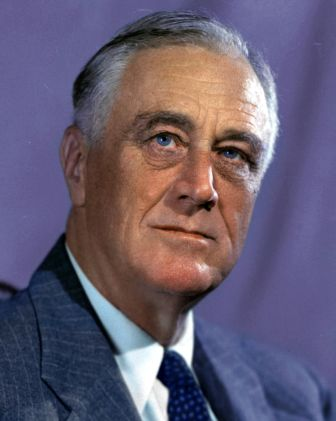
President Roosevelt’s message to Congress
November 2, 1942
To the Congress:
On December 23, 1941, I approved a statement of war production policy for Canada and the United States, which contained the following recommendation:
Legislative and administrative barriers, including tariffs, import duties, customs, and other regulations or restrictions of any character which prohibit, prevent, delay, or otherwise impede the free flow of necessary munitions and war supplies between the two countries should be suspended or otherwise eliminated for the duration of the war.
The needs of the war effort have multiplied our demands for a maximum and integrated war production not only at home and in Canada, but in every country of the United Nations. We must further take advantage of possibilities of procurement from every available source, foreign or domestic. Speed and volume of war output have become more than ever before in our history the primary conditions of victory.
To achieve an all-out war production effort, we must implement and supplement the steps already taken by the Congress and the President to eliminate those peacetime restrictions which limit our ability to make the fullest and quickest use of the world’s resources. At my direction, the government agencies have already removed and are engaged in removing, wherever possible, numerous administrative requirements and formalities affecting the movement of war goods, information, and persons into or out of the United States. There remain, however, many legislative obstacles to that movement which impede and delay our war production effort.
These obstacles fall into two classes: those directly affecting the movement to and from the customs territory of the United States of materiel, information, and persons needed for the war effort, such as customs duties and the laws, and the administrative supervision required by law affecting movement of persons and property at our borders and ports; and those which impose limitations on the procurement, acquisition, or use of non-American articles or the transportation of supplies in non-American bottoms, such as restrictions on the use, under construction differential subsidy contracts, of non-American materials in the construction of vessels under the Merchant Marine Act of 1936, as amended; on the procurement of any article of food or clothing not grown or produced in the United States or its possessions; on the acquisition for the public use, public buildings, or public works of non-American articles; or the transportation by sea of Navy supplies except in vessels of the United States.
I have already exercised by executive order the power granted under the First War Powers Act to extend to the government procurement agencies the authority granted to the Secretary of the Navy to make emergency purchases abroad of war materials and to enter them free of duty. This has measurably assisted our war effort, but it only partially eliminates the obstacles prescribed by law which I have already mentioned.
I, therefore, recommend early enactment by the Congress of legislation to the extent required for the effective prosecution of the war, the free movement of persons, property, and information into and out of the United States. I do not now recommend that the Congress repeal or amend any of these peacetime restrictive laws. It is my judgment that the problem can best be dealt with by giving to the President for the duration of the war, but no longer, the power on a selective and flexible basis to suspend the operation of all or any such laws, in such a way as to meet new and perhaps unforeseen problems as they may arise, and on such terms as will enable the Chief Executive and the government agencies to work out in detail parallel action in other countries.
U.S. Navy Department (November 1, 1942)
Communiqué No. 176
South Pacific.
On October 29:
-
U.S. aircraft continued attacks on enemy positions on Guadalcanal Island.
-
During minor ground operations two enemy 75-millimeter guns were captured west of the Matanikau River.
-
During the late evening a Douglas “Dauntless” dive bomber attacked two enemy destroyers near Tassafaronga. No hits were scored but the destroyers were driven westward toward the Russell Islands.
On October 30:
-
During the early morning our dive bombers attacked enemy destroyers in the vicinity of the Russell Islands. Results of the attack have not been reported. One dive bomber failed to return.
-
During the morning seven Grumman “Wildcats” attacked the enemy at Rekata Bay. Three “Zero” float planes and two biplanes were shot down and buildings and a fuel dump were strafed and set on fire.
-
During the morning U.S. surface ships bombarded enemy positions on Guadalcanal. The cannonading lasted more than 2 hours and some artillery and several buildings and boats were destroyed.
Communiqué No. 177
South Pacific.
The first detailed report of the naval air battle which was fought on October 26, to the eastward of the Stewart Islands, was received by the Commander-in-Chief, U.S. Fleet, this afternoon from Vice Adm. Halsey, Commander of the South Pacific Area. In this report the following damage to the enemy was detailed:
- Four to six heavy bomb hits on an aircraft carrier of the Zuikaku class.
- Two medium bomb hits on another aircraft carrier of the same class.
- Two heavy bomb hits on a battleship of the Kongo class.
- One heavy bomb hit on a second battleship.
- Five medium bomb hits on a cruiser of the Tikuma class.
- Torpedo and bomb hits on a heavy cruiser.
- Two torpedo hits on a heavy cruiser.
Reports indicate the definite destruction of more than 100 hundred enemy aircraft and the probable destruction of about 50 others.
The above action was first reported in Navy Department Communiqué No. 169 and subsequent reference was made thereto in Navy Department Communiqué No. 171.
